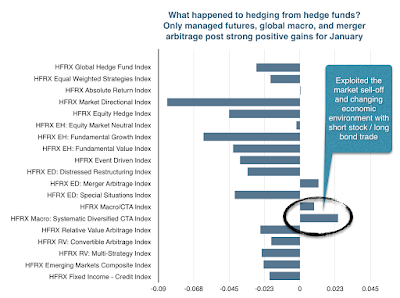How many surveys say, "Investors are increasing their exposure to alternatives"? Well, there is a world of difference based on what strategy you choose. This differences becomes especially apparent when you see performance at extremes like January. Using the returns from the HFR indices, the only hedge fund strategies that generated positive returns were managed futures, global macro, and merger arbitrage. The absolute return index posted only 42 bps which we are not including with the top three. Merger arbitrage continues to be driven by deal flow. The rest of the strategies have some level of beta and posted negative returns.
Managed futures and global macro were able to combine short equity exposures with long bond risks to generate significant returns. The risk-off switch from risky equities to safe bonds worked well. Additionally, these traders were able to generate gains in currencies and from the continued fall in commodities. The big loser was the market directional index which well exceeded the lose in the S&P 500 index. A number of strategies were not able to get out of the way of the equity decline and posted negative returns of over 2%. Of course, a month does not make a year, but hedge funds diversified returns but did not hedge this month.
January focuses the discussion on our two style breakdown of convergence and divergence traders. When there is a strong market dislocation, the divergence traders like trend-followers, will do better than those that bet on stability and convergence. If you think global economics are changing and the investment world is characterized by dislocations, you have to ask, "How much exposure do I have to divergent strategies?" Its is still early in the year and looking at the alternative allocation in detail makes sense to ensure you have enough divergent strategy exposure.

No comments:
Post a Comment